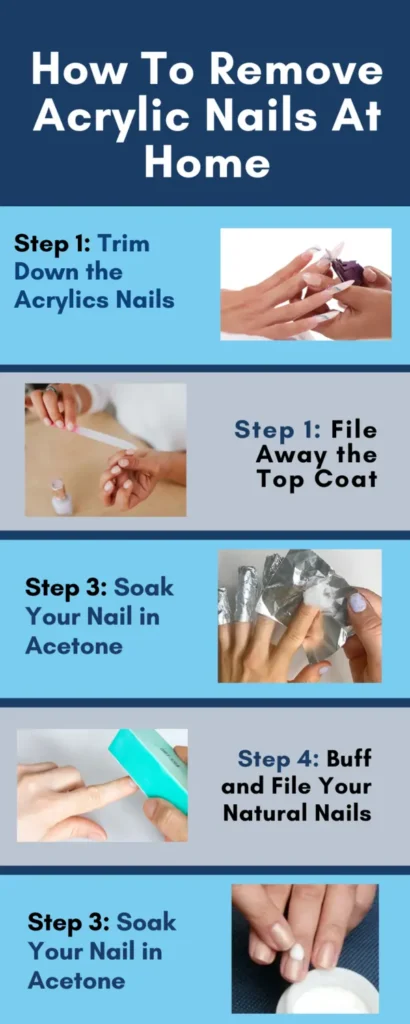While getting your acrylics professionally removed at a salon is always the safest way, we get it, emergencies happen! This guide is given by nail salon experts who suggest how to take off acrylic nails at the salon or home without totally wrecking your natural nails.
We’ll cover how to tackle acrylic removal with and without acetone, along with some aftercare tips to get your natural nails healthy again.
Meet the Nail Experts
- Kristin Gyimah is a licensed nail artist in Los Angeles.
- Ashlie Johnson is a licensed nail artist in Los Angeles.
- Anna Miles is a licensed nail artist in New York City.
Required Tools for Safe Acrylic Removal
- Acetone Nail Polish Remover
- Cotton Balls
- Nail Clippers
- Nail File or Buffer
- Petroleum jelly
- Orangewood Stick or Cuticle Pusher (Optional)
- Aluminum Foil or Small Bowls
- Hand Lotion or Cuticle Oil
How To Remove Acrylic Nails At Home
Step 1: Trim Down the Acrylics Nails
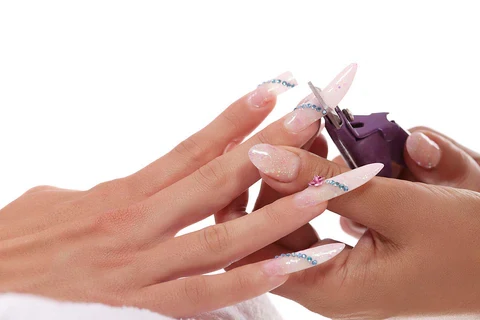
Use nail clippers to carefully cut off most of the acrylic length. This minimizes filing time and reduces the risk of accidentally clipping your natural nails.
Read Also: Best Trending Nail Art Designs
Step 2: File Away the Top Coat
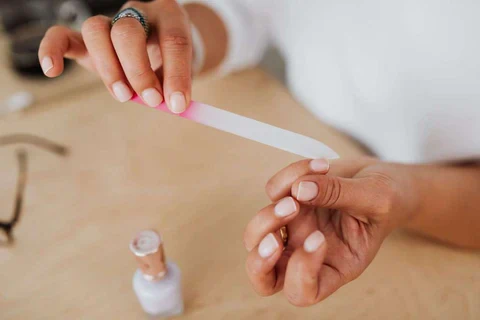
Buff away the acrylic’s shiny topcoat with your 180-grit file. This disrupts the surface layer and helps the acetone penetrate better in the next step.
Step 3: Soak Your Nail in Acetone
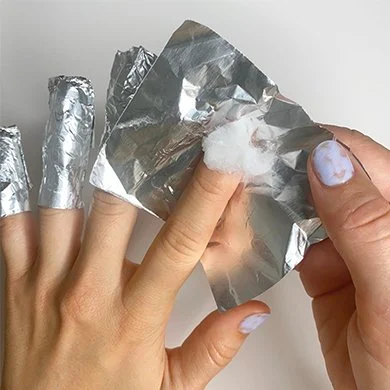
For safe acrylic nails removal at home, open windows for ventilation and avoid flames as acetone is flammable. Soak cotton balls in acetone, place one on each nail, and wrap them with aluminum foil to trap heat and vapors.
After 10-15 minutes, gently push any loose acrylic away from your natural nail with an orangewood stick or your fingertip. Be patient and avoid forcing it off. If the acrylic isn’t ready, re-soak for a few more minutes.
Step 4: Buff and File Your Natural Nails
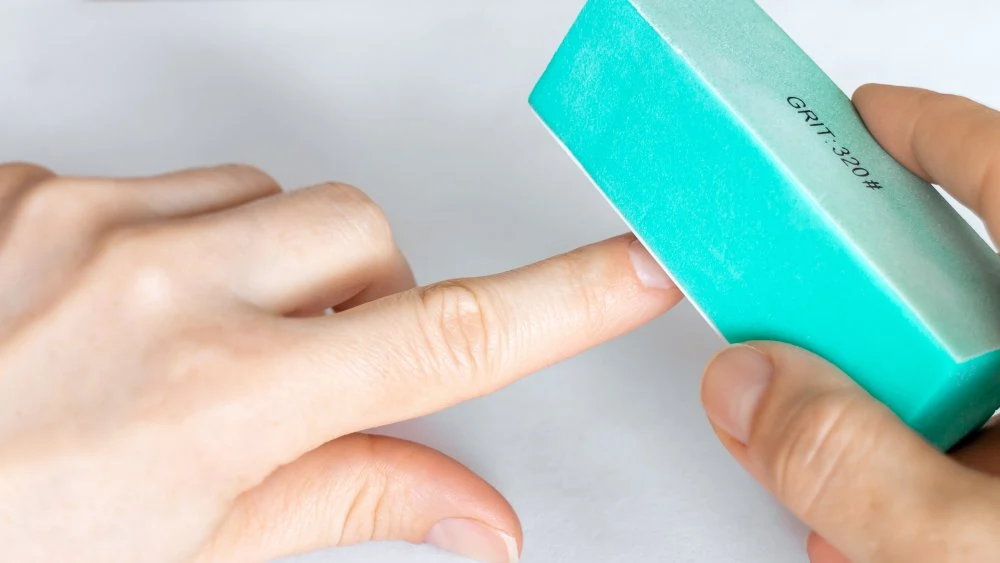
Once all the acrylic is removed, use your nail file to shape your natural nails to your desired style. Then, follow up with a finer grit file to smooth out any ridges.
Step 5: Apply Moisturizers On Nails
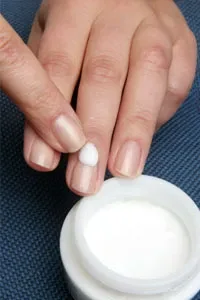
Acrylic removal can be drying. Counteract this by giving your nails a good soak in warm water with a few drops of olive oil. Afterward, apply a generous amount of hand lotion or cuticle oil to replenish moisture and promote healthy nail growth.
Important Note: Make cuticle oil and hand lotion for your new BFFs! Regularly applying them throughout the day will keep your nails and cuticles hydrated and healthy.
How To Take Off Acrylic Nails Without Acetone
Removing acrylic nails without acetone is possible in 2024! This guide explores gentle methods using readily available items like soap and water, along with tips to minimize damage and promote healthy natural nails. Be aware, that these methods might take longer than using acetone, but your nail artist should be an expert in how to remove acrylic nails and finish with a cuticle!
- Soak nails in hot, soapy water for 20-30 minutes.
- Gently use an orangewood stick to loosen the acrylic.
- Repeat soaking or use cuticle oil to further loosen stubborn nails.
How To Remove Acrylic Nails At Home Without Tools
It’s practically impossible to remove acrylic completely without any tools. Acrylics are designed to have a strong bond with your natural nails, and safely getting them off requires some way to break down that bond and buff away the material gently.
Read More: 30 Short Coffin Nails Designs To Rock This Season 2024
A nail file is the most basic tool needed for at-home acrylic removal, even with additional methods like soaking in hot water or using non-acetone removers.
Note: Removing both acrylic vs gel nails involves acetone, but the method differs. Acrylics soak off entirely, while gel gets filed off after the acetone weakens the bond.
How To Remove Acrylic Nails At Salon
- The technician will trim and file your nails to remove any length and shape the natural nail bed.
- Acetone-soaked cotton balls will be placed on each fingertip. The technician might use wraps or clips to secure them.
- You’ll relax for about 15-20 minutes while the acetone loosens the acrylic bond.
- The technician will gently remove the softened acrylic with a cuticle pusher or orangewood stick.
- Any remaining acrylic residue will be buffed away, and your natural nails will be shaped and smoothed.
- The technician will apply cuticle oil and lotion to hydrate your nails and hands.
Conclusion
Taking off acrylic nails at home can be a breeze with the right approach. By following these steps and using the recommended tools, you can say goodbye to your acrylics without saying hello to damaged natural nails. Remember, if you’re ever unsure or uncomfortable during the process, it’s always best to consult a professional nail technician.
You may also read: Ombré Nails Are Back! 12 Hot Designs for 2024
FAQs
How to soak off acrylic nails?
Clip excess acrylic, then buff the top coat. Soak cotton balls in acetone and place on nails. Wrap with foil for 10-15 minutes. Gently push off loose acrylic with a cuticle pusher. Buff and moisturize natural nails.
How long do acrylic nails last?
Acrylic nails themselves can last for 6 to 8 weeks with proper care. However, they require maintenance. To maintain their look and prevent damage to your natural nails, you’ll need refills every 2 to 3 weeks.
What are acrylic nails?
Acrylic nails are artificial nail extensions made from a liquid and powder mixture. They offer strength and length, allowing for creative nail art designs. Applied by a professional, they require maintenance and soak off with acetone remover.
How much do acrylic nails cost?
Acrylic nails typically cost between $30 to $60 for a basic set, depending on your location and desired design. Fill-ins to maintain your acrylics are generally cheaper.
How long to soak acrylic nails in acetone?
Soak acrylic nails in 100% acetone for 30-40 minutes. The acrylics may loosen before then, but this timeframe ensures most will be ready for gentle removal. Don’t pry if they’re not ready, soak for longer to avoid damaging your natural nails.
Is it OK to take acrylic nails off at home?
It can be done but with caution. Removing them yourself increases the risk of damaging your natural nails. Consider going to a professional for the safest option.



